Sensitize School Students to Social Problems through Scientific Methods
And Cultivate their Capacity to Address and Solve Social Issues for a Better World
Compassionate Citizenship Program
COVA Peace Network
in collaboration with Education Department, Government of Telangana 2024-25
With focus on producing professionals- doctors, engineers etc.- there is little scope in the school education system in India to provide space to students for direct engagement with social issues to sensitise them to the problems being faced by different sections and make them compassionate beings.
The Result: Increasing overall indifference across society leading to insensitivity, hatred and violence against fellow beings and the environment.
The Objective of Compassionate Citizenship Program of COVA is to take the students beyond textbooks and classrooms to also make them compassionate human beings who are sensitive to different social issues through extension lectures, direct field engagements and Project Works with affected sections of society. Students are also encouraged and equipped to undertake micro level social transformations and community improvement to enable and motivate them to live a life as responsible citizens and Change Champions of their communities.
Compassionate Citizenship Program: An Overview
COVA in collaboration with the School Education Department, Government of Telangana undertook a Pilot Project of the Compassionate Citizenship Program in 120 schools in 4 districts of Telangana State during the year 2022-23. Enthused by the outstanding outcome and perceptible impact on the students, the Education Department has entered into an agreement with COVA for the implementation of the Program in 3000 schools of Telangana State.
COVA facilitates students from member schools to undertake systematic study of selected social issues and produce Project Reports detailing the problems and suggesting strategies and solutions for their resolution. The Program involves introducing students to different social issues through lectures by experts, using libraries and internet for research, orientation to basic methodology of social sciences to undertake systematic field work including face to face interviews, group discussions, transact walks etc, training in social advocacy to represent to officials and elected representatives for redress of issues, learning about communication through media and preparation of Project Reports following scientific principles to document their understanding of a social issue, efforts undertaken to address it and results.
Implementation of the Program
1. Type of Schools: Government, Private, Corporate, Residential, KGBV
2. Classes for Inclusion: 7th to 9th
Activities:
1. Lectures on different social issues;
2. Project Work for students on selected social issues;
3. Exposure visits to localities, villages, media houses, government offices etc;
4. Training in advocacy to equip students to interact with elected representatives and government officials for redress of issues;
5. Undertake small actions in collaboration with communities to improve local environment;
6. Project Works Display Programs
7. Training of Teachers to enable them to guide and mentor students in their Project Works
8. Partnership with Volunteers of NSS (National Service Scheme) for delivering lectures in schools and to Escort students for Field Study
Responsible Activism
A Key Objective of this Program is to equip and enable students to undertake micro level social transformations and community improvement as responsible citizens. This will be achieved through the following:
1. Encouraging and training students to formulate possible solutions for the issues undertaken as Project Work
2. Equipping them to prepare Representations for elected representative and officials and facilitate their meetings with authorities.
3. Propagate their findings and solutions for social issues through posters, rallies, presentations in their schools and communities and short video messages for social media
4. Preparation of Media Releases and communications to highlight their issues for members of the public
Duration and Activities:
The Program requires 40 hours in an academic year.
During School Timings- 24 Hours
1. Lectures: 8 Hours
2. Preparation of Questionnaires and Analysis: 3 Hours
3. Field Visits: 4 Hours
4. Advocacy Visits / Interactions: 3 Hours
5. Project Works Display: 6 hours
All activities can be scheduled during bagless days, without disturbing the academic schedules of the schools.
After School – 16 Hours
1. Field Visits: 6 Hours
2. Research on Internet: 4 Hours
3. Report Writing: 6 Hours
Implementation Mechanism
The Program will be implemented through State and District Coordination Committees constituted jointly by the Department of Education, Government of Telangana, District DEO Offices and COVA.
It is proposed to implement the Program in 22 districts of Telangana covering 130 schools in each district. Other leading NGOs with experience in education and outreach to schools will also partner for the implementation of the Program to cover 3000 schools.
COVA is the State Coordinating Organisation. District Coordinators and Program Officers are appointed in each District for implementation of the Project in their district with the cooperation of Offices of DEOs, State and District Coordination Committees and school managements.
Compassionate Citizenship Program
COVA Peace Network
In collaboration with
Education Department, Government of Telangana- 2024-25
Four to five topics are covered every year. Activities around every topic include lectures by experts, enabling students identify different stakeholders affected by or affecting the issue, field visits for interviews, identification of key problems, formulation of possible solutions, and finally actions- including advocacy with officials and elected representatives- to address the issues involved.
Topics Proposed for 2024-25
1. Climate Change
2. Drugs Menace
3. Eve Teasing
4. Differently Abled
The Topics covered by the Program in previous years include:
1. Child Labour
2. Child Safety
3. Problems Parents Face In Educating Children
4. Issues Of Government Schools
5. Sports And Recreation
6. Parks And Playgrounds
7. Participatory Budgeting For Students
8. Violence Faced By Women And How Can They Be Protected
9. Eve Teasing
10. Dowry
11. Public Services:
12. Health
13. Government Hospitals
14. Junk Food
15. Garbage Disposal
16. How To Make India Litter Free
17. Genius With Junk: Creating Beauty Or Utility Out Of Waste
18. Citizens Charters And Their Functioning
19. Citizen’s Charters Of GHMC
20. Water Works And Electricity Department
21. Swatch Hyderabad
22. Transport
23. Speed Driving
24. Corruption
25. Heritage: Practices For Protection And Conservation Around The World
26. Exploring Cultural Commonalities Of South Asia
27. Environment
28. Climate Change
29. Water Conservation
30. Global Warming
31. Endangered Species (Flora & Fauna)
32. Bio-Diversity
33. Nuclear Power
34. Social Media
35. Fake News
36. Understanding The Issue Of Begging And Its Solutions
37. Care Of Elders
38. Public Life In Prison: Impact On Inmates Their Families
39. Life Of A Farmer: Challenges And Remedies
40. Study On Impact Of COVID On Different Sections Of Society
41. Different Types of Violence In Society And Their Impact
42. What Are the Major Conflicts In India And How Can They Be Addressed
43. Why Is There War In Ukraine And Its Impact on The World
44. Impact of War and Riots on a family
1. Child Labour
2. Eve-Teasing
3. Dowry
4. Social Media – Fake News
5. Care of Elders
6. Problem Faced by Parents in educatin
7. Life in Prison
8. Life of a Farmer
9. Water Conversation
10. Participatory Budgeting
11. Genius Beauty Utility out of waste
12. Genius with Junk
13. Government Hospitals
14. Heritage
15. Environment – Plastic Usage
16. Public Services
Impact of Compassionate Citizenship Program
A Student explaining about Public Services
Impact of Compassionate Citizenship Program on the Perspective and Social Commitment of a Student
Sana Siddiqui – Problems of Parents
Environment and Plastic. Be Fantastic Say No to Plastic
Social Media – Fake News
Care of Elders- Display of a Project Work
Project Work on Participatory Budgeting
Eve Teasing
Social Media Fake News
Care for Elders. Elders should live in Sweet Home not in Old Age Homes
Amtul Karim explaining about Public Services
Environment and Plastic. Be Fantastic Say No to Plastic
Care for Elders. Elders should live in Sweet Home not in Old Age Homes
Student Testimonials – Compassionate Citizenship Program
A Student Sharing Her Experience of Compassionate Citizenship Program
Impact of Compassionate Citizenship Program on the Perspective and Social Commitment of a Student
A Teacher on the Impact of Project Works on the Perspectives of Students
Understanding Gained about Different Forms of Violence at Sambandh
Understanding Child Labor through Project Work
COVA- ICAN
Compassionate Citizenship and Responsible Activism Program
For School and College Students
Media Reports
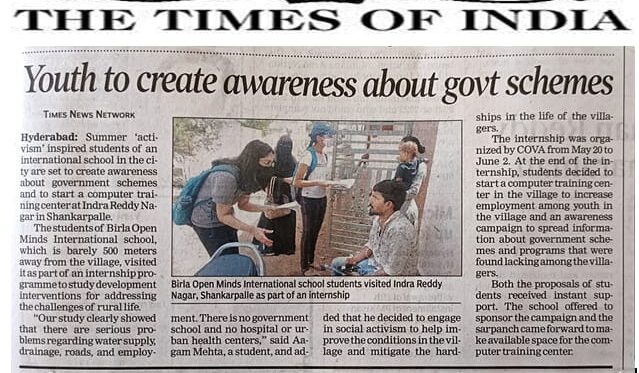
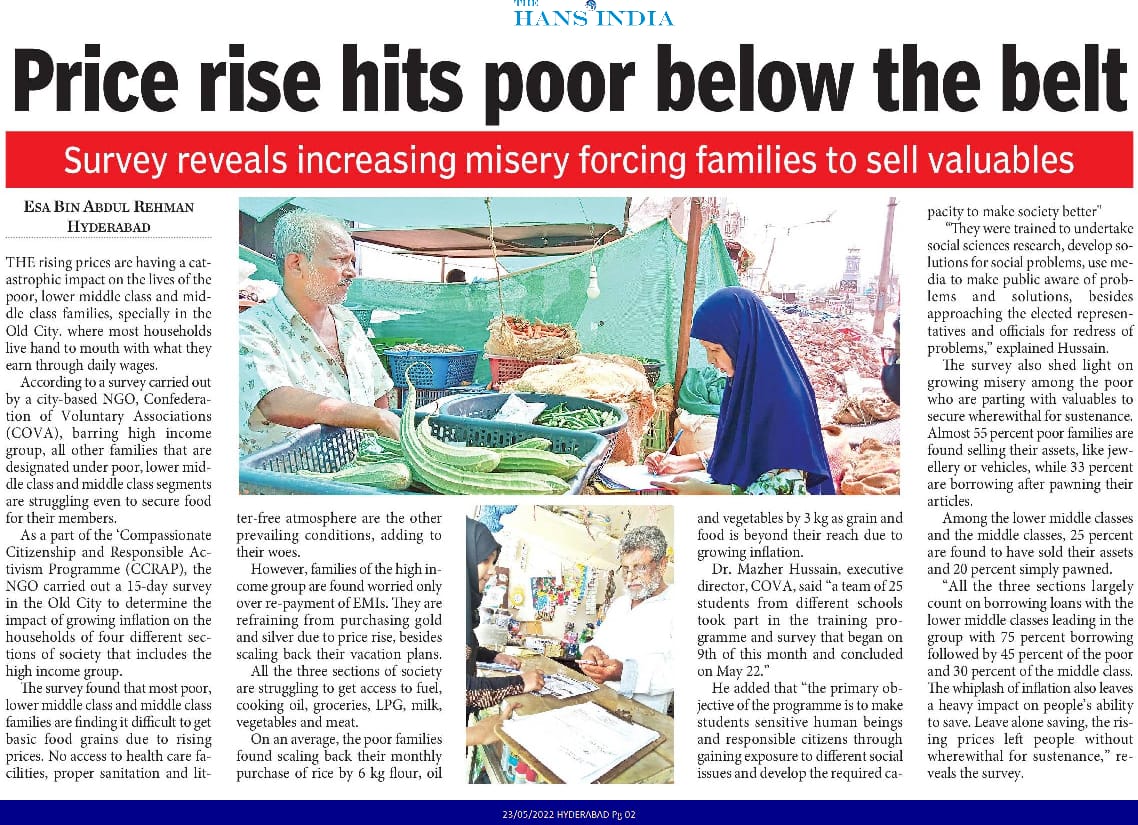
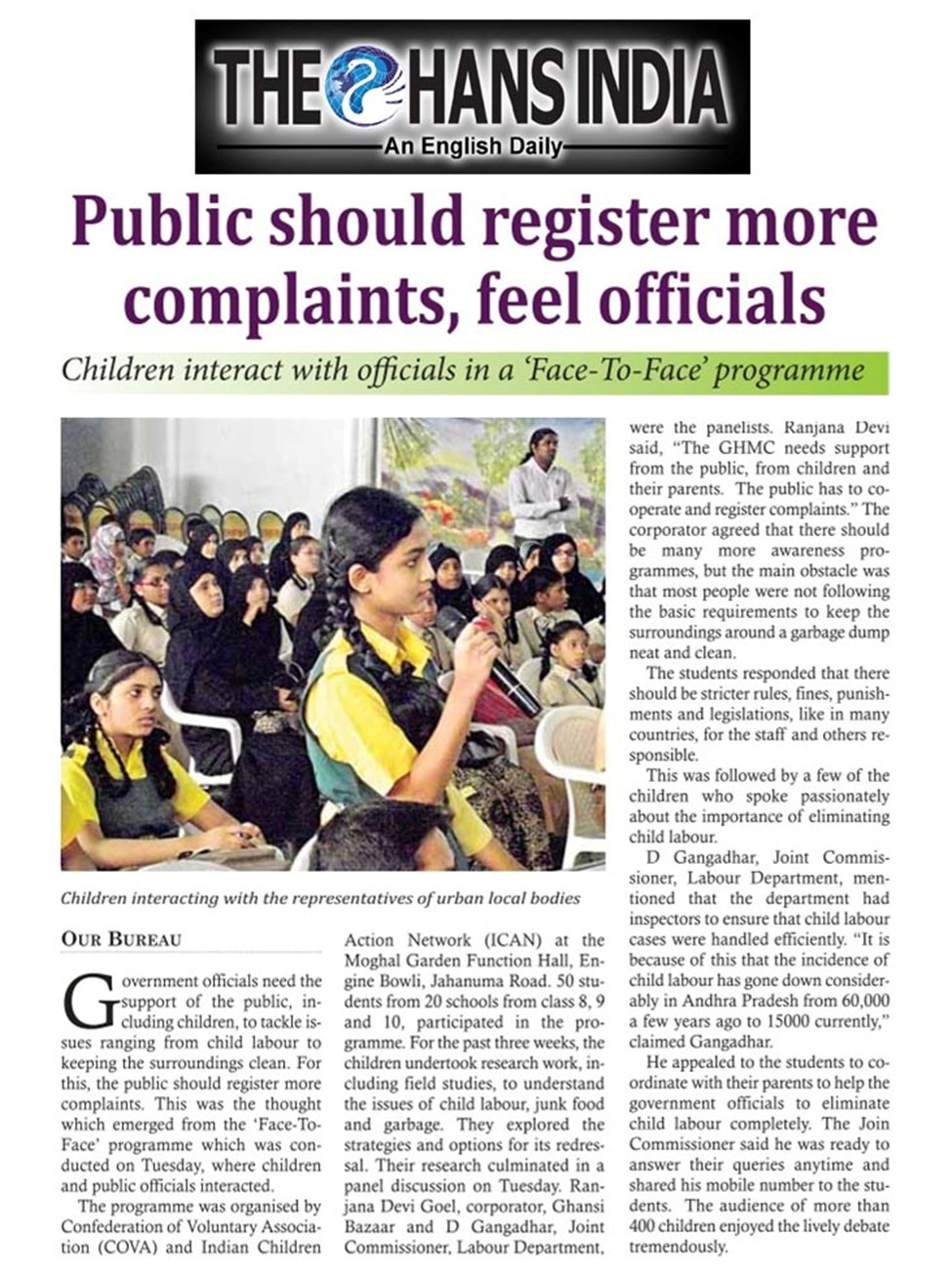
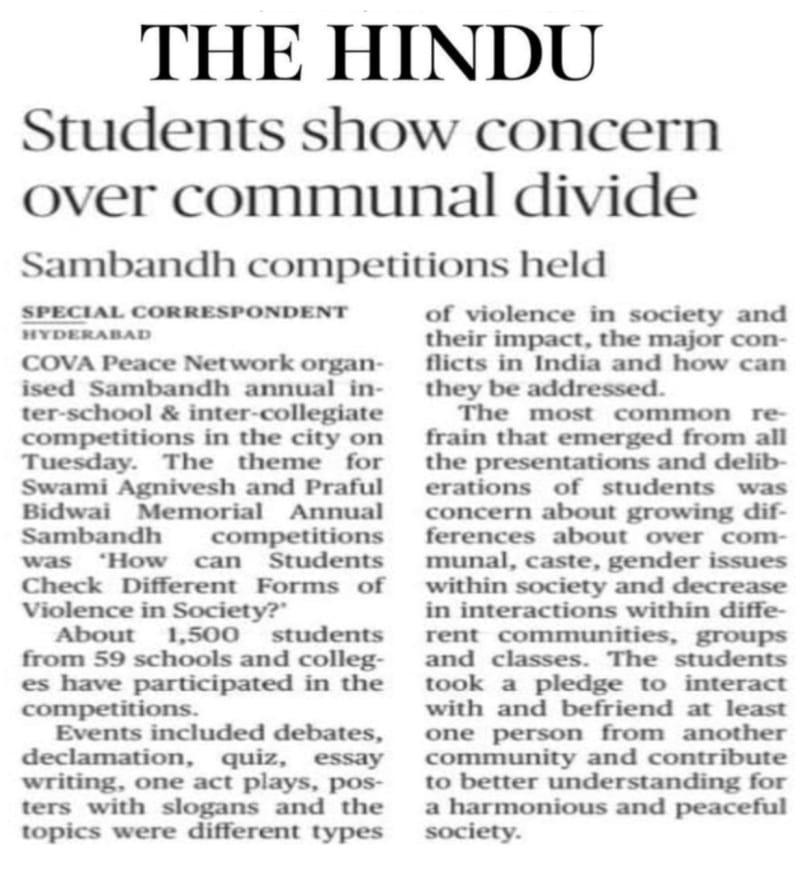
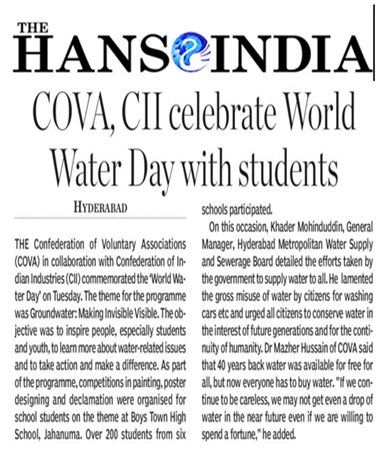
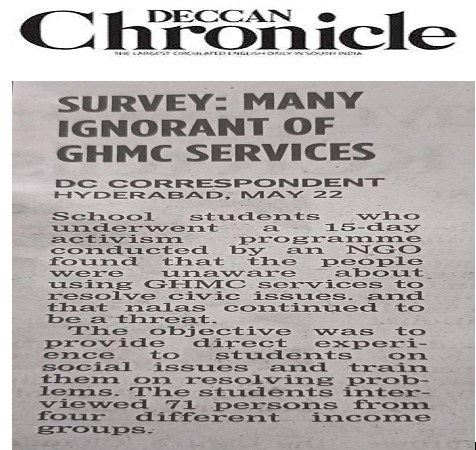
HYDERABAD: JUNE 11, 2013 00:00 IST
Student activism: It gets GHMC going
If you are inspired and committed, you can do a lot. This was proved by a group of student activists who made the GHMC set right the dysfunctional clock atop the Mahbub Chowk. What the students did was to dash off representations to the civic body which forced it to repair the clock which had stopped functioning.
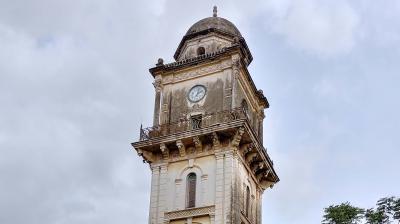 Heritage protection- The GHMC also ordered an enquiry into the excess charges collected at parking lots and agreed to put up boards displaying the approved parking fee. The students also convinced a local channel to telecast messages and run scrolls on water conservation and other social issues. The student activists plan to get government support and corporate sponsorships for restoration and protection of heritage buildings in Hyderabad and strive for the establishment of Hyderabad Culture Museum at Khurshid Jah Dewdi. All this is the result of a month-long activism program conducted by COVA and ICAN on various social issues. A theatre training workshop was also organized by the Koshish Theatre Group, a COVA affiliate, wherein 50 students participated.
Heritage protection- The GHMC also ordered an enquiry into the excess charges collected at parking lots and agreed to put up boards displaying the approved parking fee. The students also convinced a local channel to telecast messages and run scrolls on water conservation and other social issues. The student activists plan to get government support and corporate sponsorships for restoration and protection of heritage buildings in Hyderabad and strive for the establishment of Hyderabad Culture Museum at Khurshid Jah Dewdi. All this is the result of a month-long activism program conducted by COVA and ICAN on various social issues. A theatre training workshop was also organized by the Koshish Theatre Group, a COVA affiliate, wherein 50 students participated.
FEBRUARY 27, 2012 18:07 IST
Young activists in action
The COVA-ICAN exhibition was aimed at developing social activism and the topics ranged from child labour, environment to issues affecting the Government schools. For students of city schools, meeting with children working in automobile workshops, general stores and selling bangles on pushcarts in Charminar sensitised them on the worrisome issue. Equipped with the draft of NCLP, they questioned the child labour rehabilitation project officer.
Field work
“We spoke to a child working in a shop in Khilwat. His father was killed in an accident and there was no one to feed his extended family. So he left school to take care of them,” says Syed Azimuddin, a Std. VIII student.
“The shopkeepers were rude to us when we questioned them about employing children,” adds his team mate Syed Abdul Raza, sharing their field report with other school children visiting the COVA-ICAN exhibition.
Social activism
The event was aimed at developing social activism among students of schools in old city. The topics in focus ranged from child labour, environment to issues ailing the Government schools. It was after meeting Schoolchildren of Government schools and visiting the schools in Rein Bazaar, Imam Bada and Edi Bazaar that the students presented the problems haunting the Government schools, namely appalling student-teacher ratio, lack of drinking water facility and unsafe buildings.
How healthy?
Children of Yakutpura recorded the health hazards affecting their locality. They shared the footage over the laptop – unhygienic conditions abutting the nala flowing through Dabeerpura, Yakutpura and Talab Katta, and the garbage dump near the TB Hospital. “How can garbage be dumped near a health centre?” questions Abdul Basith, a Std. VII student of Imam Baksh Memorial High School.
As for the nala, he says that a road build over the long nala can decongest the traffic in the narrow lanes here.
The exhibition definitely found the young activists come up with out of the box solutions.
Abdul Basith Std.VII, Imam Baksh Memorial High School: “We recorded the land and water pollution in the nala at Yakutpura. A road built over the long nala can be a deterrent for people to dump wastes and serve as a walkway or road for people.
Sumeina Kausar, Std. IX, Rainbow High School: Government schools were established by the State to meet education needs. What we found was lack of infrastructure, mid-day meal and teachers.
Hafsa,Std. IX, Crown International School: Our project was on pollution. Air pollution is the cause for breathing problems. One is witnessing global warming. Acid rain results in damage to monuments.
Unisha Mirza,Std. IX, Lords Model School: We focused on the impact of pollution. Sound pollution can have a negative impact on health. Likewise, alarming deforestation and water pollution can have a dangerous impact on our lives.
TIMES NEWS NETWORK
Students get into social activism
Hyderabad: Social activism in schools of Old City is fast catching pace with students not only joining hands in awareness issues but also finding solutions for them. These students are studying doing research and preparing projects on issues pertaining to the society.
Almost 100 schools in the city in association with COVA and India Children’s Network (ICAN) are motivating students to undertake activism to solve social problems as socially-conscious and responsible citizens.
Mohammed Turab, executive secretary of COVA, said: “ The objective of such social activism projects is to make them independent in not only identifying the problem but also in solving them, Students chose issues such as traffic management, speed driving, citizens charter, etc, for their project and work towards getting a solution for the same. We have identified student representatives from all schools who later presented their project work to the government officials concerned.”
Take for instance, Azmath Unnisa,a class VIII student of Imam Baksh Memorial High School, who did a project on speed driving, “Since I was not aware about the topic, I met several trafic policemen to figure out that there is a sensor in each bike that buzzes when the speed is too high. This sensor is used only in New Delhi as of now.”
It is only after working on this project that Azmath realized that if this sensor is used in Hyderabad as well, many accidents can be avoided. Azmath’s father Abdul Rahman said: “These projects act as a platform for students to raise the issues to the officials concerned. Through these projects, our student representatives meet several senior government officials and discuss the issues with them.”
Social activism is performed through a structured methodology in all schools. Bal Adalat, a question-answer session between students and various noteworthy speakers of society, would soon be conducted to make students even more active.
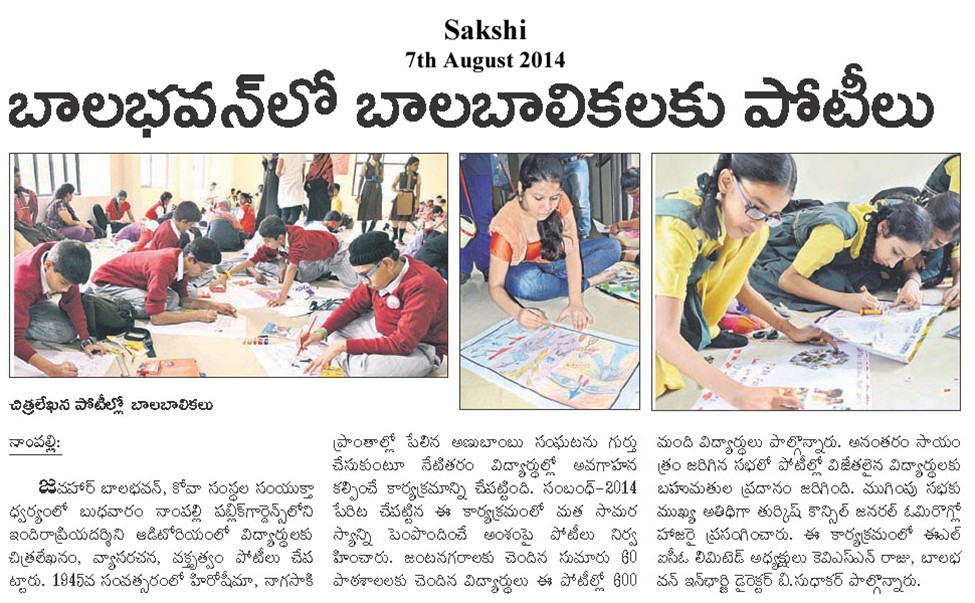
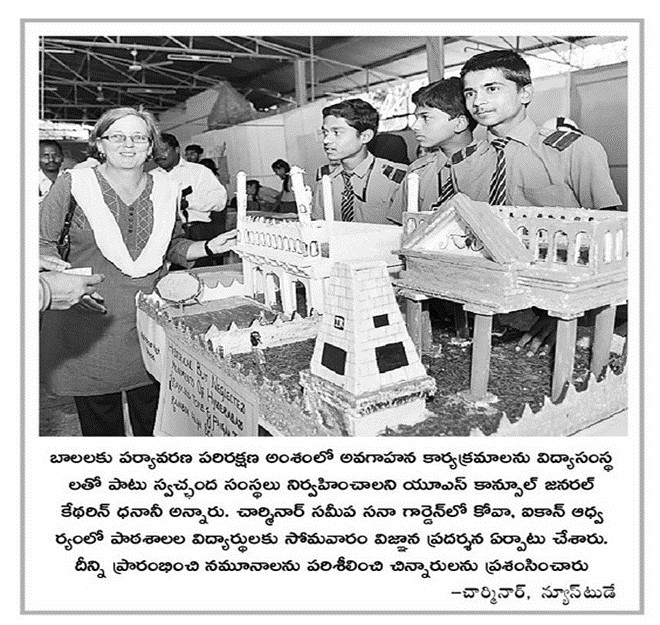
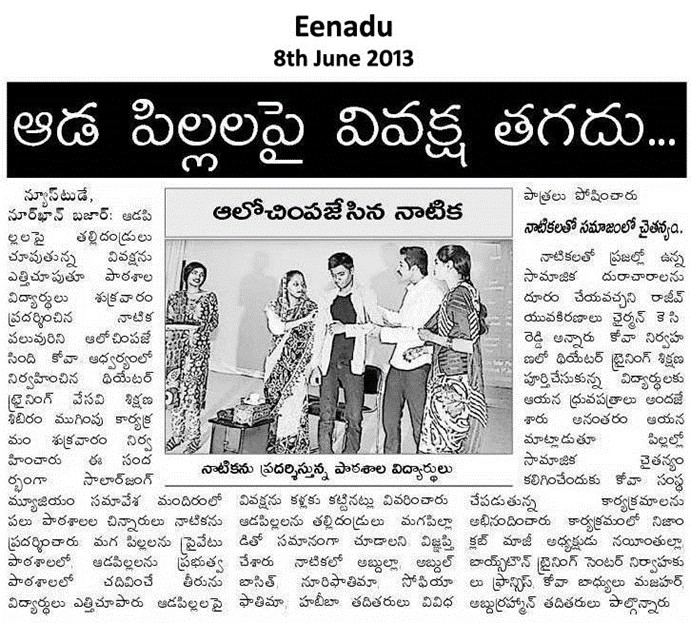
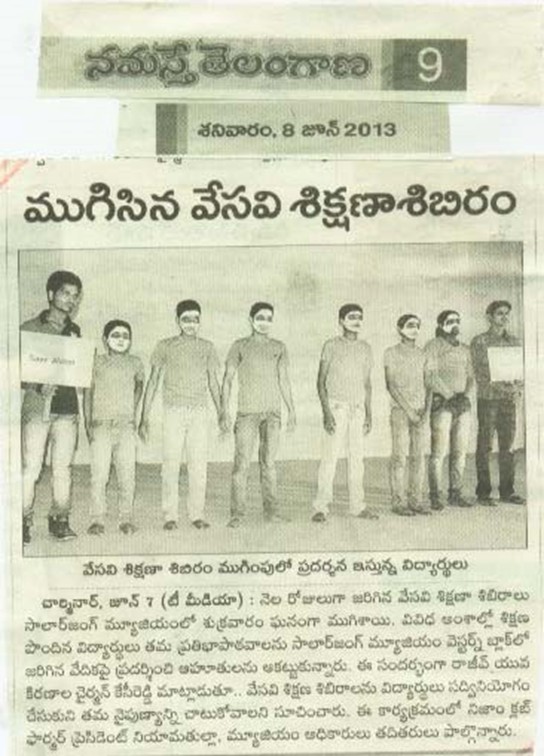
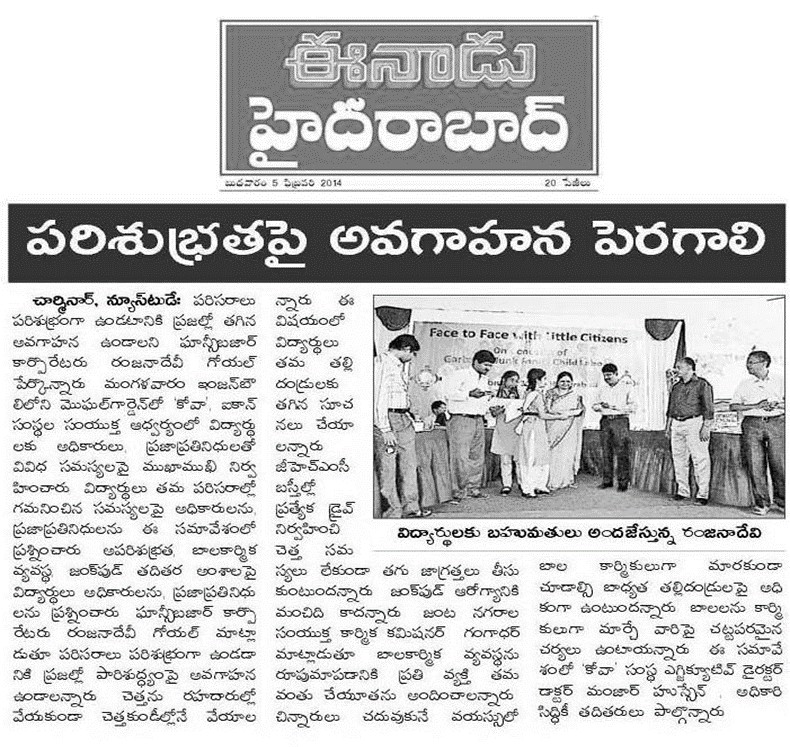
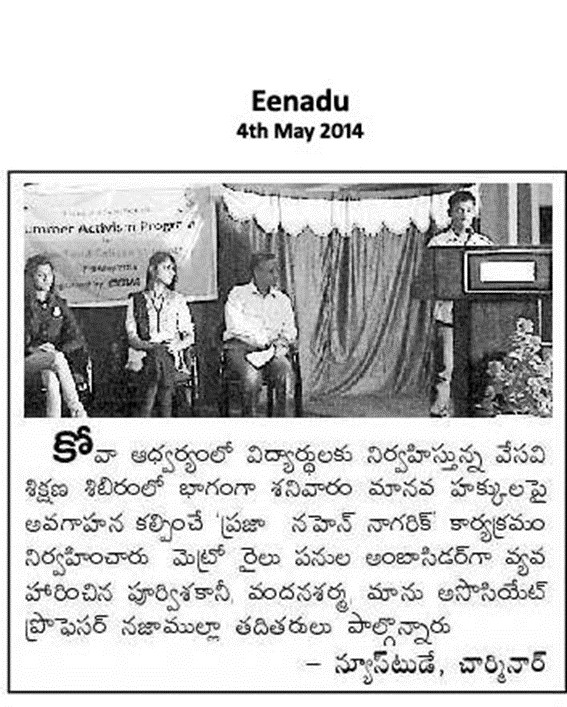
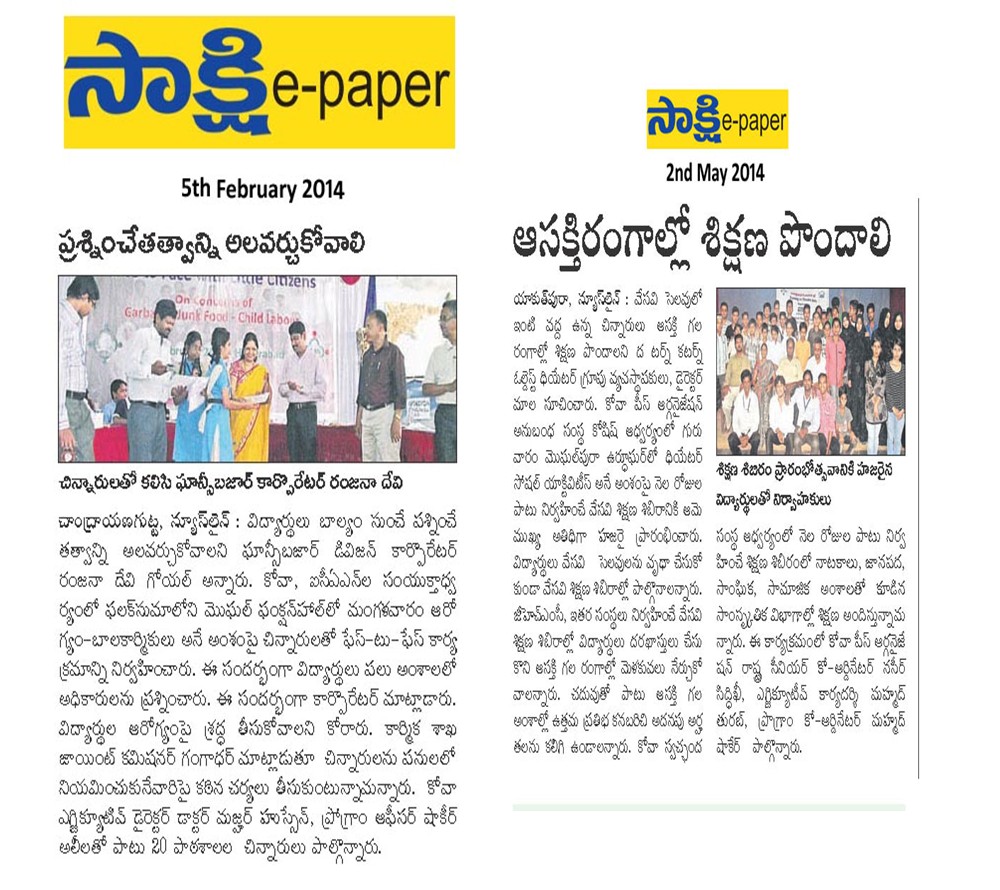
COVA- ICAN
Compassionate Citizenship and Responsible Activism Program
For School and College Students
Case Studies
1. Orientation of Little Citizens on Summer Activism
Achievement of Little Citizens: During the field visits carried out in May- June 2012, apart from many findings, students noticed that dog biting menace was rampant in some areas leading to incidences of rabies. They took up the issue as a challenge, carried out a detailed survey of the affected area and made a representation to the Chief Veterinary Officer, GHMC.
As a result, dog squads came into action immediately to catch stray dogs and the incidence of dog bites came down substantially and immediately in the affected areas making the students happy with their first success in Social Activism!! From June 2012 there will be follow up by the students on social activism on the issues of situation in government schools, hospitals and initiatives for more and improved recreation facilities.
2. Students Access Civic Services f Society as Responsible Citizens
Ghousiya Yasmeen, Tabassum Sultana, Ayesh Omar & Zaheda Kulsum, all girl students of Hyderabad Mission High School, undertook a Project Work on accessing civic services from Greater Hyderabad Municipal Corporation (GHMC) as assured by the Citizens Charter and gained understanding about the range of services offered by GHMC, time frames for delivery and modes to register complaints through use of mobile App, call centres, Facebook, email etc.



They did a field survey to identify issues and decided to file a complaint about littering and a pile of garbage lying uncleaned near their school. They downloaded the GHMC app and submitted their grievances with the department for which they received an acknowledgement detailing their complaint number, name and number of the concerned officer and the time frame within which the issue will be addressed. Consequently, GHMC cleared the garbage within 30 hours of the complaint and they received another message saying that the complaint is addressed and if they have any issues or dissatisfaction, they can reopen their complaint again.
3. Understanding the Issue of Begging and Rehabilitation
Mohd Tanveer, Owais Shaik Raof, Saahil Baig, Syed Sifaan from Grace Model School undertook a Project work on ‘Understanding the Issues of Begging: Solutions to Change their Lifestyle. The survey was conducted near school area, wherein beggar and local people were asked questions on types, issues, causes, and current living scenario of beggars.
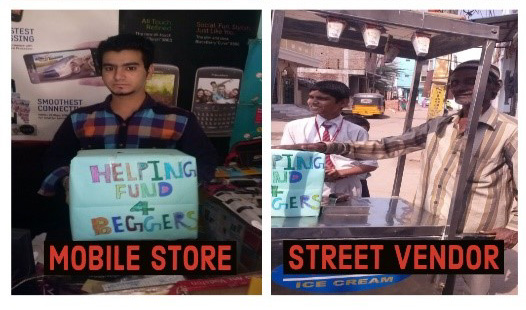
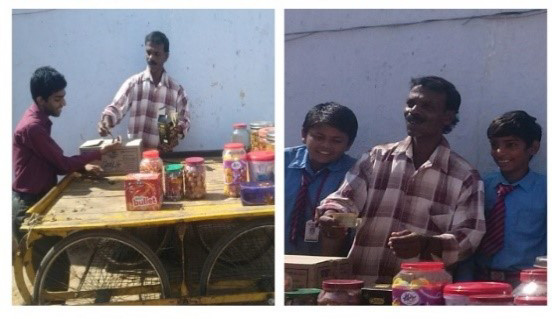

The survey results revealed that some beggars, who are other-wise physically fit, take to begging at any excuse. One such example was beggar Shiva, who has lost his fore arm and took to begging.
The students decided to try and bring change in at least one beggar’s life and convinced Shiva to start working. To help him start a business the students made a money collection box and went on a street to get donations from police stations, medical halls, mobile stores and so on. With the collected Rs. 1143. They rented a cart for Shiva along with some biscuits, sweets etc to sell. Students also took permission from their school principal to let Shiva sell in front of the school. Siva was happy and agreed to work instead of begging. The change in Shiva’s life would definitely encourage students to continue their work for social transformation in future also.
4. Topic: Government Hospitals
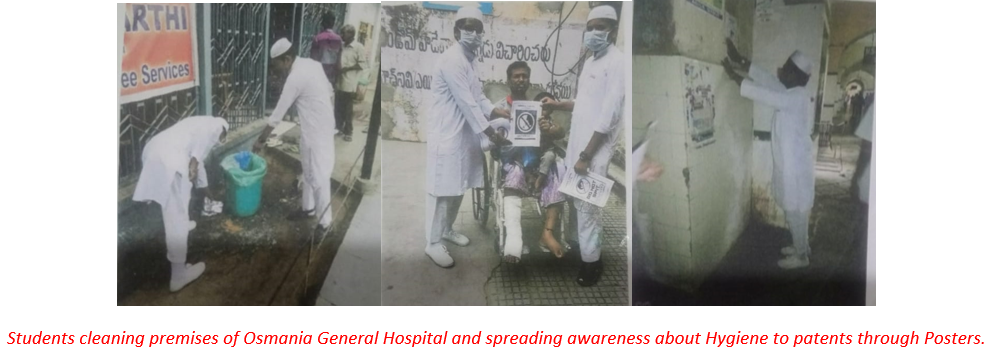
‘The action was required, and we did it with immediate effect’ say Zabiullah and Md Saifullah students from MS Creative School who participated in the 14th Project Works Program in 2018 and worked on the topic of government hospitals. The boys went to Osmania General hospital and found that the place was overcrowded and the premises very unhygienic. They also found that patients and their attendants were finding it difficult to access information about where the facilities are. This motivated the students to do something about the situation and contribute in their own little way to change.
They began with buying a couple of face masks, some bleaching powder, some floor cleaner, and dustbins. They picked up the trash in some of the common areas, cleaned the floors, put some disinfectant and put up dustbins in the area for the public to use. In order to bring in the behavioral change, they made posters on not spitting and keeping the surroundings clean and put up in the areas where there was a lot of littering and spitting. Later, they tied a couple of ropes at places that were prone to crowding to make sure people follow a Queue. The students are visiting the hospital once every week and repeat the same.
Impact of Compassionate Citizenship Program
A Student explaining about Public Services
Impact of Compassionate Citizenship Program on the Perspective and Social Commitment of a Student
Sana Siddiqui – Problems of Parents
Environment and Plastic. Be Fantastic Say No to Plastic
Eve Teasing
Devi- Gender Justice – Birla Open Minds International School – Kollur
Sambandh 2024 – Gender Justice – ZPHS Shivirampally, Hyd
Sambandh 2024- Misuse of Mobile – TMRJC Charminar Girls – 1, Hyd
Life of a Farmer- Impact on a Student
Gained Understanding of Violence and Non Violence- AStudents
Multiple Benefits- Students
Key learnings- Student
Video of a Teacher on Impact on Students
Teacher on Impact on Students
Sandeep Panday- Magsaysay Awardee on Impact
COVA Peace Network
Compassionate Citizenship Program
Perspective, Attitudinal Transformations and Advocacy Actions by Students
Students have started posting videos on YouTube on different Topics talking about the change in their perspectives, attitudinal transformations and actions taken by them to address and resolve issues. The videos can be seen at: https://www.covanetwork.org/in-school-curriculum/#1667992675634-0f1e5718-3ec1
Advocacy Actions and Policy Transformations Proposed by Students- Some with Success!
1. Care of Elders: Elders forced to wait for hours in Government Hospitals for treatment when they are sick.
Representations to Health Minister and Officials: To have special counters or timings for elders in Government Hospitals to decrease their waiting period when they are sick
2. Participation in Budgets: Most students are not given any orientation in schools or by the families in preparing budgets and spending as per budgets for managing their own expenses or of the family or school.
Representation to Secretary Education: Government should give direction to all schools for inclusion and participation of students in school annual day, sport day and other events.
Some students submitted Representations to the Principals of their schools with success
Some have convinced parents to allow them to plan and prepare budgets for their own Birthdays. Results are inspiring and interesting!
3. Menace of Eve Teasing:
Representation to District Collectors: Government should include lessons in School Curriculum to prevent Eve Teasing
4. Problems faced by Parents in Educating Children:
Representation to Secretary Education: Government should provide text books, notebooks and uniforms to all private school students as provided to the students of government schools.
5. Religious Congregations to Spread Awareness on Social Issues:
Most religions have weekly congregations where large numbers gather for prayers
Representations to Faith Leaders: Of Hindu, Muslim and Christian Faiths to spread awareness against Eve Teasing, Dowry, Child labour, Care of Elders and other social problems in their weekly congregations.
Reports from The Hindu: Student activism- It gets GHMC going
1. Clock of the Clock Tower:
The Clock of Mahbub Chowk Clock Tower had become dysfunctional
Representation to GHMC (Greater Hyderabad Municipal Corporation got the clock ticking again within 3 days! The Hindu Newspaper carried a big story!
2. Excess Parking Fees charged from citizens– with no Sign Boards for Parking Charges: Representation to GHMC: An Enquiry was ordered into the excess charges collected at parking lots and GHMC agreed to put up boards displaying the approved parking fee.
3. Parks and Play Grounds: There are very few parks and play grounds- especially in Old City areas of Hyderabad and in many cases, land earmarked for parks and play grounds is encroached.
Representation to GHMC: Students argued that houses and buildings are acquired and demolished by the Government for Road Widening. Similarly, some houses and building should be acquired by the Government for setting up parks and play grounds as required by the international Urban Planning Norms.
4. APPs and Call Centers for Registering Complaints regarding Civic Services: GHMC, Water Works and Electricity Department offer 56 civic services and any complaints about deficiencies in these services can be lodged through APPs and Call Centers of these departments. But most people are not aware Call Centers and Apps to make complaints.
Action by Students: Campaigns to reach out to people to help download Apps and use Helpline numbers
5. Dog Menace: Dog biting menace was rampant in some areas leading to incidences of rabies.
Action by Students: Carried out a detailed survey of the affected area and made representation to the Chief Veterinary Officer, GHMC.
Result: Dog squads came into action immediately to catch stray dogs and the incidence of dog bites came down substantially and immediately in the affected areas!
Initiatives for Micro Transformations
1. Child Labour: Interviewing Child labourers for their Project Work on the Topic, students of two schools met two child labourers who showed interest in continuing education but could not do so due to financial constraints of the families
Action by Students: One group of students spoke with the principal of their schools who accepted to admit the student without any fee. Students collected money from teachers, family and friends of books and uniform: the Child was Back in School!
The second was a government residential school with free education and hostel facilities. The boy joined the school and parents also accepted as they were not required to pay anything.
2. Rehabilitation of a Begger: A young healthy man had lost his arm and took to begging.
Action by Students: Three students who were working on a Project on Beggers persuaded him to take up some livelihood activity and he agreed. The students collected Rs. 3,500 from their teachers, family, medical shop and even the local police station and got a push cart on hire for him and also provided some material like cookies, sweets, pencils, rubbers for sale. They also got permission for their school Principal to allow him to keep his cart near the school gate. His business is booming with over 600 students purchasing from him!!
3. Support to Family of a Farmer who had committed suicide: 100 students from 5 schools who were doing Project Work on Life of a Farmer were taken to a village. Over 85 had not visited a village and only 2 had met a farmer. When asked the source of hid food grains, one student answered: Local Kirana Store.
Engagements: Students saw different activities involved in farming, tried their hand at transplantation of paddy but soon gave up due to back pain! Also met farmers including a family where a young farmer had committed suicide leaving behind a young wife and two children aged 7 and 9 years.
Action: Impressed by the backbreaking work involved in farming and moved by the plight of the young family with their father dead, students collected and gave Rs. 22,000 for school fees of the two children.
4. Saying No to Plastic: It is reported that one girl student in Warangal threw away all plastic items from the house and asked parents to use items of steel and other non- plastic material!
TEAM COVA
Mob: +91 9959517766
Email: cova@covanetwork.org

